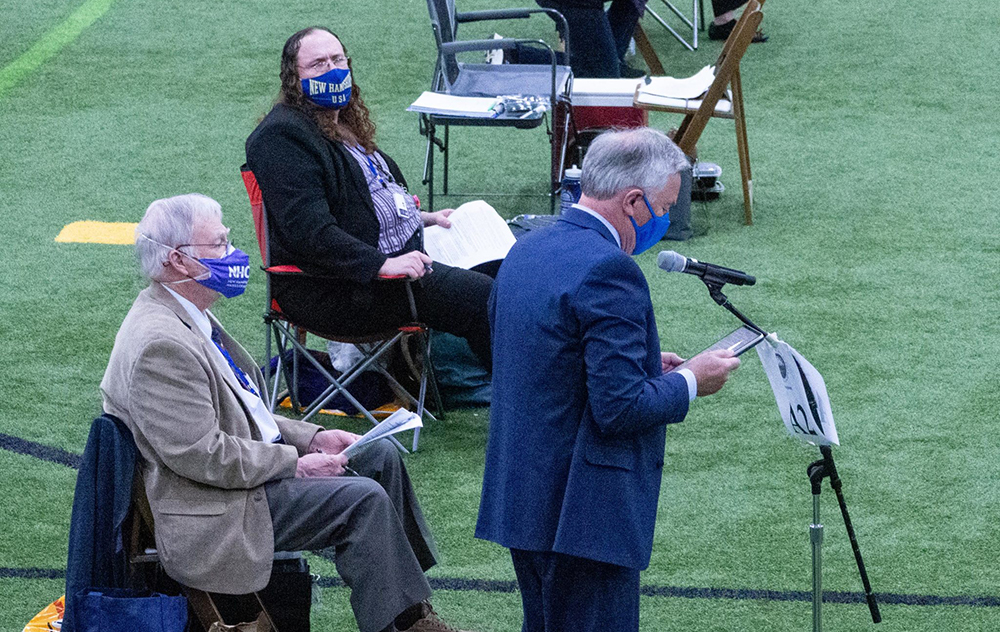Radical libertarians in New Hampshire have pushed a popular Republican governor to the right. That might save the Democrats a Senate seat. The original post can be seen at https://washingtonmonthly.com/magazine/november-december-2021/the-white-mountain-boys/?fbclid=IwAR1h9RFZNX8XOn7rfIDfLIeO1Qfi_v8awJZKYz07rKFNj7qqwRhS1pkEUZ4#.YYmThyhe3jk.facebook
By Rob Wolfe,
One muggy June day in the New Hampshire House of Representatives, Bill Marsh, a Republican from the picturesque lake town of Wolfeboro, rose to buck his party. The chamber, newly under Republican control thanks to an alliance between conservatives and libertarian activists, was considering an amendment that would ban mandatory vaccinations amid a global pandemic—all mandatory vaccinations, covering diseases from COVID-19 to mumps to hepatitis. Marsh, a retired ophthalmologist who has pushed fellow Republicans to take pandemic precautions more seriously, framed his objection as pro-business. He asked, “Why would we interfere with private businesses’ right to protect themselves, their employees, and their patrons?”
The amendment’s sponsor was Terry Roy, a veteran, devout Christian, and self-described constitutional conservative. He spoke next in defense of the measure, launching into a rambling diatribe that referenced child labor, slavery in the American South, “Chinese bats,” and the dangers of fluoridated tap water. “Does my body, my choice only apply to abortion?” he said, according to a House transcript. “What about new advances in science? What if we determine someone’s characteristics can be genetically altered in utero? Would we allow mandated gene therapy? After all, propensity for carrying certain diseases costs billions in health care. What about vaccines for the flu? Will employers mandate those next?”
Roy’s amendment narrowly failed, 193–182.
Retribution for the speech was swift and decisive—Marsh’s speech, that is. Within days, Marsh resigned from his committee, Health, Human Services and Elderly Affairs, after party leadership informed him that he would be removed as vice chairman. Later that summer, Roy was appointed vice chairman of the influential Criminal Justice and Public Safety Committee, replacing another wayward conservative who had disobeyed the party’s radical
new leadership.
A key factor in the extremism, and the extraordinary conservative successes, of this New Hampshire legislature is a group of libertarian activists known as the Free State Project. Founded in 2001 in hopes of establishing a government-free utopia, the Free State Project encourages liberty-minded people to move to New Hampshire to help push its politics even further toward low taxes and minimal state intervention. As of 2021, there are more than 5,000 Free Staters in New Hampshire. Despite their small numbers, they have built a well-funded and organized political apparatus that has elected roughly 45 Republicans to the New Hampshire House of Representatives. The libertarians vote as a bloc that, with a slim majority, the party can’t do without.
With Free Staters at their back, Republicans this year have cut taxes in the already income-tax-less state, banned critical race theory and late-term abortions, and launched what’s likely the most sweeping education voucher program in the nation. Under House Majority Leader Jason Osborne, a Free State mover, anti-authority libertarians have joined with anti-elite populists to shoot down anything that smacks of expertise or specialized knowledge. Recently, a joint House-Senate committee tabled its acceptance of $6.3 million in federal funds for addiction counseling in the opioid-ravaged state, with members saying they needed to see proof that counseling even works.
Over the past two decades, Free Staters have walked a long path from obscurity and ridicule to undeniable power. And as popular Republican Governor Chris Sununu eyes a 2022 U.S. Senate run, he may remember that a Free Stater, Aaron Day, is often credited with spoiling the 2016 Senate race for Republican incumbent Kelly Ayotte. A year from now, the potentially vulnerable Democratic Senator Maggie Hassan may try to tie him to the libertarian extremism he has refused to reject, observers say. And if Sununu wins, he’ll enter the U.S. Capitol with a group of constituents he can’t afford to offend.
The founder of the Free State Project, Jason Sorens, is a mild-mannered college professor with a mop of brown hair, a boyish smile, and a knack for making even the most outlandish ideas sound like simple arithmetic. During the 2000 elections, Sorens, then a graduate student at Yale, watched with dismay as the Libertarian Party failed to earn more than 1 percent of the national presidential vote. If disaffection with the major parties wasn’t enough to swing elections, what was? Despair turned to anger over the course of the long New Haven winter, and then to determination. One day, Sorens sat down at his computer, queued up some heavy metal, and started a manifesto.
“Libertarian activists need to face a somber reality,” he wrote: “nothing’s working.” There are too few libertarians, spread too thinly across the United States, to make a difference through partisan politics, he argued. The only way to break free from oppressive government is to move together to one state, take over its political system, and use threats of secession to force the federal government to leave its residents alone. Uprooting one’s life would be inconvenient, yes. But, he wrote, “our forefathers bled and died—because of the Stamp Tax! The Free State Project requires nothing of that kind, and the stakes are so much higher. How much is liberty worth to you?”
In July 2001, Sorens sent the 2,000-word broadside, titled “Announcement: The Free State Project,” to an obscure libertarian publication—L. Neil Smith’s The Libertarian Enterprise—expecting little response. Then the emails started coming. And coming. People from all over the country wanted to sign up.
For its first few years, the Free State Project existed just as an idea, an internet forum where liberty-minded folk could fantasize about freedom from government overreach during the height of the war on terror. Far-flung libertarians signed a pledge to move together to one place and change its politics, often with the assumption that it would never actually happen. But in 2003, the movement took a significant step toward reality. In a nationwide vote, members chose their “Free State.” Would it be Texas, independent and suspicious of authority, but perhaps too populous for a small group of activists to influence? Wyoming, sparsely populated, but geographically expansive enough to make coordination difficult? In the end, it was New Hampshire. Population 1.2 million, with no income tax, the land of “Live Free or Die” was small enough, and libertarian enough, for a little band of determined freedom fighters to swing even further toward liberty.
The revolution had begun. It looked—well, a bit clownish. The pledge to move to New Hampshire did not technically take effect until 20,000 people, the number Sorens calculated would sway state politics, had signed. Until then, it was the most zealous, with the fewest connections to society, who chose to make the move. In 2004, as chronicled by the journalist Matthew Hongoltz-Hetling in his book A Libertarian Walks Into a Bear: The Utopian Plot to Liberate an American Town (and Some Bears), New Hampshire got an early look at its colonizers-cum-liberators in the form of a grizzled, gun-toting posse of men who settled in the woods of Grafton, a town of some 1,100 with low taxes and no zoning regulations. Calling themselves the “Free Town Project,” the early movers took aim at local government, savaging the budget and constraining the town librarian’s bathroom breaks to a portable toilet. Bears, lured by the trash left outside the freedom fighters’ woodland shanties, made increasingly bold incursions into human settlements, which the Free Towners and another, separate commune of anarchists drove back with firecrackers, pistols, and nail-studded booby traps. (And, in one case, a llama named Hurricane.) Human society, meanwhile, nearly broke down. At annual town meetings, the Free Towners demanded that Grafton eliminate its police department and secede from the United Nations, which, they feared, might one day levy taxes or even invade. At one of these meetings, which regularly ran past eight hours, Free Towners reduced the moderator to tears.
Antics like these soon expanded beyond Grafton, dominating headlines about the Free State Project for its first decade. In Keene, New Hampshire, a group of “Robin-Hooders” declared war on the city’s parking officers starting in 2009, following them with video cameras and popping quarters into meters to foil local government’s ticket-hungry schemes. Every summer in the White Mountains, Free Staters gathered for the libertarian version of Burning Man: PorcFest, a cryptocurrency and substance-fueled celebration with few rules, many assault rifles, and a giant wooden porcupine that the Free Staters (known as prickly, independent “Porcs”) set ablaze at the festival’s end.
It wasn’t until 2016 that the Free State Project reached 20,000 signers, the magic number that “triggered the move” to New Hampshire. After a triumphant press conference in Manchester, the state’s largest city, Jason Sorens and other Free State VIPs retired to an after-party at a local speakeasy bar. (The password: “TRIGGERED.”) “It’s happening!” Sorens said giddily, imitating the popular meme of an arm-waving, celebrating Ron Paul. But Sorens, by this time the respectable face of the movement, with scholarly publications and an appointment at Dartmouth, had doubts, too. He no longer believed in secession, and he feared that the extremists in Grafton had cast a bearded, AK-47-wielding shadow on his brainchild. If all government should be eliminated, he mused, should we just let the roads fall apart? A sheepish grin stole across his face. “I don’t know—maybe that makes me a bad libertarian.”
Sorens wasn’t alone. For years, mainstream Democrats and Republicans alike viewed the Free Staters with suspicion. That included former Speaker Shawn Jasper, who, as recently as 2017, warned fellow Republicans that they must “distance themselves” from the Free State Project. Sununu, however, has understood the importance of courting the liberty faction since his first run for governor, in 2016. The Free Staters’ preferred candidate, Frank Edelblut, came within 1,000 votes of defeating him in the Republican primary. After winning the general election, Sununu offered Edelblut, a financier and homeschooler with no public school experience, control of the state department of education. It was a preview for a dance—neutralizing a rival, while recruiting from his base—that Sununu would do for years to come.
All the while, the Free State Project’s numbers and influence have been growing. Five years ago, the group claimed 2,000 movers and 17 legislators. Though only about 3,000 more people have arrived since then, far from the hoped-for 18,000, the movement’s legislative numbers have nearly tripled in that time—a function of outside investment and the peculiar structure of the New Hampshire legislature.
The New Hampshire House of Representatives has 400 total members, an enormous number of citizen legislators who receive nominal salaries and often run with little to no opposition. In recent years, political organizations such as the Koch-funded Americans for Prosperity appear to have recognized that these seats offer good value for their money. In the 2020 cycle alone, the group’s New Hampshire chapter spent nearly $847,000 on statehouse races and other statewide elections, often in support of Free State candidates, according to state filings. Meanwhile, as the Republican Party nationally has taken a populist, anti-elite turn, libertarians and conservatives are ever more united—in what they’re against.
Jason Osborne moved to New Hampshire from Defiance, Ohio, in October 2010. He had signed the Free State pledge years earlier, during graduate school, and mostly forgotten about it. But as he looked for a place to raise his four-year-old daughter, he was drawn by the prospect of a like-minded community in New Hampshire. A few months before his move, he took the stage at PorcFest 2010 to belt a karaoke rendition of “Minority,” by the left-leaning punk band Green Day. He sang, with equal doses of irony and prophecy,
I want to be the minority
I don’t need your authority
Down with the moral majority
’Cause I want to be the minority.
Once in New Hampshire, Osborne, who manages his family’s student debt collection firm, Credit Adjustments, Inc., gave generously to libertarian causes and built a profile in the community. He won his first election in 2014, and was elected majority leader this year. His financial profile—he donated $50,000 to a PAC financing
liberty-oriented statehouse candidates this cycle—and ability to deliver a growing libertarian base made him a strong choice for the leadership role. In an interview this fall, he said he hasn’t attended Free State Project events such as PorcFest since 2013, though he remains part of the legislature’s “liberty” faction, which includes sympathetic native New Hampshire-ites.
Osborne portrays himself as a “bottom-up” consensus builder, but under his leadership, the party has been strict in enforcing unity, and not just in the case of Bill Marsh. In summer 2021, nine-term state Representative Lynne Ober intentionally called a premature vote that threatened Republicans’ plans to kill Sununu’s paid family leave proposal and limit the governor’s emergency powers amid the pandemic. As punishment, leadership stripped Ober of her regular-session committee role. She and her husband, Representative Russell Ober, resigned from the legislature.
Punishments for speaking out haven’t been confined to Republicans. After the January 6 insurrection, Rosemarie Rung, a Democrat from Merrimack, was stripped of her committee assignments by the Republican speaker for tweeting a condemnation of a New Hampshire police chief who had attended the rally before the Capitol riot.
If there is irony in libertarians embracing a party controlled by a distant plutocrat who tried, and failed, to institute authoritarian rule, the Free Staters do not accept it. Sorens and other libertarians said they didn’t believe Donald Trump had the same sway over the Republican Party in New Hampshire. But Sorens, now director of the Center for Ethics and Society at St. Anselm College, still has his doubts. He worries especially that libertarians will become more conservative as they’re embraced by Republicans. But, he noted, libertarians can still find things to appreciate about the party of Trump; for instance, the former president’s noninterventionist policy abroad.
And take the ban on critical race theory, an infringement on free speech from which liberty-minded people theoretically should recoil. Yet it was a Free Stater and friend of Sorens’s, Keith Ammon, who brought forward that bill in the House. Here, Sorens hesitated. He thought college students and professors should be able to debate whatever ideas they wished in the classroom. But, he added, “I also don’t think I want teachers shaming five-year-olds because of their whiteness.”
Whatever their methods and allegiances, the Republican majority has achieved results. This June, the legislature passed a $13.5 billion budget for the next two years, cutting nearly $300 million from Sununu’s original proposal. Onto the budget they tacked a ban on abortions beyond 24 weeks (unless to save the mother’s life); the aforementioned ban on “divisive” race education in schools; a program creating “education freedom accounts” (essentially vouchers) that redirect public school money to private schools and homeschooling; and a raft of tax cuts.
Though familiar in Congress, the tactic of loading the budget with measures unlikely to pass on their own is new to New Hampshire, says House Minority Leader Renny Cushing. Cushing, an eight-term Democrat from the liberal seacoast region, offered grudging respect for Osborne’s abilities—“He knows how to count votes”—but says he feared this would become standard practice in the New Hampshire legislature, giving minority constit-
uencies such as libertarians and evangelicals a vehicle to push through policies the state as a whole doesn’t want. And despite libertarians’ assurances that they’re willing to ally with Democrats to protect civil liberties and other shared priorities, Cushing says he hasn’t found that cooperation to be forthcoming. “I think the allure of the appearance of power quickly trumps any principled origins they may have had that caused them to migrate to New Hampshire,” he told me.
If there was to be a breaking point between the legislature’s liberty faction and Sununu, the law they passed limiting the governor’s emergency powers seemed to have potential. Free Staters and their allies resented Sununu’s mask mandate and limits on public gatherings, and even sent rifle-wielding protesters to picket his house, forcing him to cancel his outdoor inauguration earlier this year. But he has since repealed the precautions—laxer than those of surrounding states to begin with—and has largely stayed silent as this legislature does its work.
Looming ahead is 2022. Heir to a political dynasty that has sent members to both the U.S. Senate and the governor’s mansion, Sununu has both the establishment pedigree and broad appeal—including to libertarians—that could make him a strong challenger to Hassan, especially during midterm elections in a purple state. Virtually everyone surveyed this fall agreed that he would have to keep the libertarian wing in mind, though opinions varied over the degree. Some libertarians, including Sorens, were skeptical of Sununu’s dependability, but Osborne had fewer doubts. In 2016, Hassan defeated incumbent Republican Kelly Ayotte by a margin of 1,017 votes. Aaron Day, a Free Stater running as an independent, received 17,742.
“He cannot afford to lose us,” Osborne said.
Despite some recent successes, Sununu’s embrace of the libertarian faction has put him in a double-edged position that could turn against him in a matchup with Hassan, who can link him to the extremism of the Free State Project. Cushing, for his part, says he thought that the anti-abortion legislation passed this year, both in New Hampshire and places like Texas, would hurt Sununu in a race with Hassan. This September in the town of Bedford, Catherine Rombeau narrowly won a special election for state representative, giving Democrats two of seven seats in the conservative stronghold—for the first time ever. The backlash may already have begun.
By this fall, Bill Marsh, the physician chastised for his speech against an anti-vaccine bill, appeared to have learned his lesson. If he wanted to remain a Republican under New Hampshire’s new political order, it was best to be silent.
In a brief, cautious conversation in early September, Marsh referred a reporter to the House’s daily journal, which memorialized, as he put it, “the speech that ticked everyone off.” Otherwise, he said, “I don’t want to say anything that could jeopardize what I need to do going forward.”
About a week later, the state Republican Party hosted a large rally in opposition to President Biden’s nationwide vaccine mandate. For Marsh, this was the final straw. In December 2020, then Speaker Dick Hinch had died of COVID-19 after attending two unmasked, undistanced rallies of House Republicans. Marsh, who respected Hinch, publicly denounced Republicans’ role in the speaker’s death. For months afterward, he worked tirelessly to promote anti-COVID regulations that could survive libertarian backlash—work that was now being undone. On September 14, Marsh, a Republican since campaigning for Ronald Reagan in 1976, changed his affiliation to “Democrat.”
“I still do see myself as a conservative,” Marsh said in an interview afterward. “I just don’t think that Republicans are holding to the principles they once avowed. I can’t call this conservatism. It’s more like—libertarianism.”










